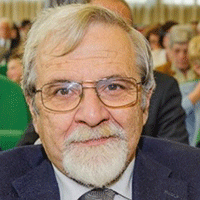
Walter Grassi
DESTEC – School of Engineering
University of Pisa
Pisa, Italy
Presentation Title:Electrohydrodynamic-induced Effects on Boiling Heat Transfer
Abstract: The paper deals with the experimental results obtained during a long lasting research about the influence of applying an electrical field to the boiling process, both on ground and in weightlessness conditions. This has been performed in our laboratory LoThAR (Low gravity and Thermal Advanced Research) in Pisa and in microgravity campaigns around the world: several aircraft parabolic flights (France), 2 drop shafts (Japan), 2 sounding rockets (Sweden), 2 satellites (Russia), and a final experiment on the International Space Station.
Two different approaches were tackled:
- The use of the electric field to affect bubbles shape, size, motion and liquid-vapor interface stability. This is the topic essentially experimented in microgravity so far and proved to be quite effective in replacing gravity by the electric field.
- Moreover, the electric fields can also be used to generate injection of ions which transport fluid particles affecting the fluid dynamics of the liquid. This is an effective means of removing vapor from the heating surface with no need of additional liquid replenishment as is the case with traditional liquid jets.
This topic is shortly treated herein showing some of the main experimental results achieved.
Biography: Professor Grassi graduated in Electrical Engineering from the University of Pisa in 1974. He started his career with research on transient boiling phenomena. In 1983, he received a U.S. DOE Fellowship for research on jet impingement heat transfer at the University of Houston (Professor J. H. Lienhard IV). He subsequently continued this research and contributed to the International Encyclopedia of Heat and Mass Transfer on this topic. He also investigated mixed convection in internal flows (in collaboration with Prof. F. Incropera, US). In the late 1980s, he founded the LoThAR Laboratory, where the effects of volume force fields on thermal fluid dynamics were investigated, also with the contribution of foreign (from Argentina, Russia, Romania) visiting researchers. Professor Grassi designed and led the first experiment on nucleate boiling in weightlessness conditions, demonstrating that gravity can be conveniently replaced by the electric field, thanks to several microgravity campaigns around the world: aircraft parabolic flights (France), 2 drop shafts (Japan), 2 sounding rockets (Sweden), 2 satellites (Russia), and a final experiment on the International Space Station. Professor Grassi was a member of the Physical Science Working Group for the European Space Agency and the founder and coordinator of the ESA Boiling Topical Team. In the early 2010s he opened new lines of research about geothermal heat pumps (in collaboration with Professor L. Laloui of EPFL Switzerland).
Professor Grassi published more than 100 scientific papers in international journals and conference proceedings, one book on heat pumps and one on solar energy is forthcoming (both with Springer). In Italian he published educational books on building physics and building energy systems and popular science books on energy and thermodynamics, complex systems and about time (book published in English by Springer). He taught courses on different topics at the University of Pisa, Thermodynamics and Heat Transfer at the University of Florence, and supervised more than 100 M.Sc. theses and several Ph.D. theses.
He held several leading positions: President of the Italian Geothermal Union (UGI), member of the European Science Foundation, member of the National Council of Technical Physics and President of the Regional Energy Agency of Tuscany. Moreover, he was Head of the Department of Energy Engineering, Director of the Doctoral Program in Energy Engineering, member of the Academic Senate, of the Board of Directors and Rector’s Delegate for Energy. He worked as a research consultant for companies (metal tempering, glass thermal treatments and performances, heat pumps and design of micro-g flying payload) and institutions. A long-lasting activity was performed for ENEA (Italian Department of Energy) concerning energy performance and comfort analysis of different types of buildings up to retirement (2021), including the Italian base in Antarctica. In 2013 Professor Grassi was awarded the Order of the Cherub, the highest academic honor given by the University of Pisa to professors who have contributed to enhancing the prestige of the University through particular scientific merits and who have significantly contributed to the University, holding important institutional and organizational positions within it.